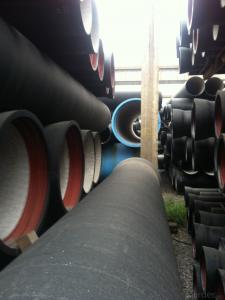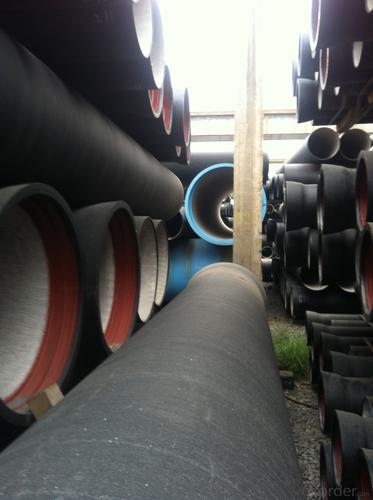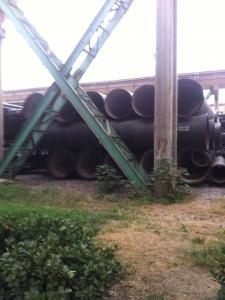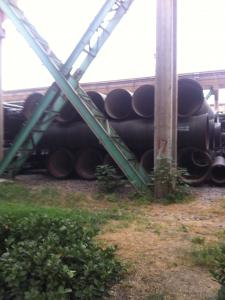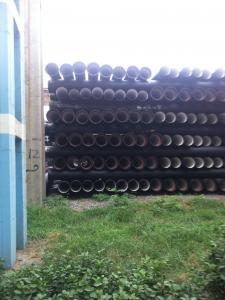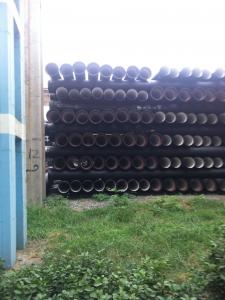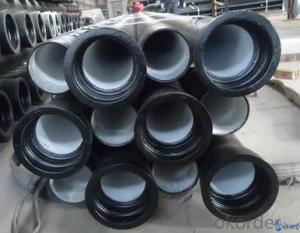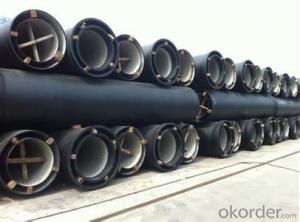DUCTILE IRON PIPES AND PIPE FITTINGS K9 CLASS DN200
- Loading Port:
- Tianjin
- Payment Terms:
- TT OR LC
- Min Order Qty:
- 22 pc
- Supply Capability:
- 3000 pc/month
OKorder Service Pledge
OKorder Financial Service
You Might Also Like
Material : Ductile Cast Iron
Size Range : DN 80mm to DN 2000mm
Unit Effective Length : 6m or 5.7m
Manufacture Standard: ISO 2531:1998/ EN 545:2006/EN 598:2007
Annual capacity : 200,000 tons
Coating Exterior: Zinc 130g/m2 according to ISO 8179-1 and bitumen coating 70 microns.
Cement Interior: Portland Cement/ High Alumina Cement/ Sulphate Resisting Cement Lining according to ISO 4179
Special requirements on external coating and internal lining can be applied
We also provide accessories such as SBR/EPDM rubber gaskets, lubricant paste, pipe caps, PE sleeves, etc.
Additional Parts:
Each pipe is strictly inspected according to related standard to ensure permanently high performance.
Easy Installation at site and service free for life
Long Service Lifespan
Quotation will arrive you within 24hours once we get your inquiry.
We guarantee offering you a competitive price.
A copy of original inspection reports of pipes will be offered after shipment.
Photos of loading process will be sent to the customer after shipment effect.
We will follow-up the delivery progress after shipment effect and update to the customer on weekly basis.
- Q: How to choose a ductile cast iron pipe with guaranteed quality
- Cutting testing: iron filing resistance, filing issued a "Shua" sound, little sticky file, debris was gray with a small amount of white spot, look at the particles of different size, with small particles of fine powder, finger milling, it is easy to make fingers black. Ductile iron filing: when the resistance ratio of gray iron is slightly larger, there are obvious "Shua" sound ", little sticky file, debris was gray with fine bright particles ranging in size but with large particles, with finger milling chips, can be dyed black to gray fingers, but more black the degree of light
- Q: How are ductile iron pipes protected against abrasion or wear?
- Various methods and protective coatings are utilized to protect ductile iron pipes against abrasion or wear. One commonly employed method involves the application of cement mortar lining on the inner surface of the pipe. This creates a smooth and durable layer that effectively resists the damaging effects of flowing water and other substances passing through the pipe. Furthermore, external protection for ductile iron pipes can be achieved by applying a bituminous or epoxy coating. These coatings act as a barrier, safeguarding against external factors like soil or chemicals that may lead to wear or corrosion. By serving as a protective layer, they prevent direct contact between the iron pipe and the surrounding environment. Moreover, in areas where severe abrasion or wear conditions are prevalent, special linings or coatings can be applied. Polyethylene encasement or polyurethane lining can be utilized to provide enhanced protection against abrasion, especially in regions where the pipe is exposed to high turbulence or abrasive materials. In certain cases, ductile iron pipes can also be reinforced with additional materials such as fiberglass or steel wire to increase their resistance to abrasion or wear. These reinforcements offer an extra layer of protection, strengthening the pipe and reducing the likelihood of damage. Overall, ductile iron pipes are designed with a combination of protective measures to ensure their durability and resistance to abrasion or wear. These measures encompass cement mortar linings, protective coatings, special linings or coatings for severe conditions, and reinforcements. These protective methods play a crucial role in prolonging the lifespan of the pipes and maintaining their functionality even in challenging environments.
- Q: Are ductile iron pipes resistant to abrasion?
- Indeed, abrasion is no match for ductile iron pipes. Ductile iron, a form of cast iron fortified with magnesium, undergoes this treatment to enhance its robustness and malleability. Consequently, it becomes exceptionally resistant to deterioration, including abrasion. These pipes find widespread use in scenarios where they encounter abrasive substances like sand, gravel, and other particles during fluid transportation. The material's remarkable capacity to endure abrasion guarantees its endurance and dependability across diverse sectors, ranging from water distribution and sewer systems to industrial pipelines.
- Q: How does ductile iron pipe perform in areas with high soil erosion?
- Ductile iron pipe is known for its exceptional strength and durability, making it a reliable choice for areas with high soil erosion. Its unique composition, which includes graphite nodules, allows it to be both flexible and resistant to fractures or cracks, even in challenging environments. This makes ductile iron pipe highly capable of withstanding the impact of soil erosion. In areas with high soil erosion, the soil particles can scrape against the surface of the pipe, potentially causing abrasions or damage. However, ductile iron pipe's thick wall thickness and corrosion-resistant coating provide an effective barrier against these abrasive forces. This means that even in areas with significant soil erosion, ductile iron pipe can maintain its structural integrity and functionality. Moreover, ductile iron pipe's ability to resist corrosion further enhances its performance in areas with high soil erosion. Soil erosion often leads to an increased presence of moisture, which can accelerate the corrosion process of certain materials. However, ductile iron pipe's protective coating, typically made from zinc or epoxy, acts as a shield against corrosion, ensuring its long-term performance and reliability. In summary, ductile iron pipe demonstrates excellent performance in areas with high soil erosion due to its strength, flexibility, and resistance to fractures or cracks. Its thick wall thickness and corrosion-resistant coating make it highly durable against abrasive forces and corrosion, allowing it to withstand the challenges posed by soil erosion. As a result, ductile iron pipe is a dependable choice for infrastructure projects in such areas, providing long-lasting and efficient water and wastewater transportation systems.
- Q: Can ductile iron pipes be recycled?
- Indeed, it is possible to recycle ductile iron pipes. Ductile iron, a form of cast iron, possesses exceptional strength and endurance, rendering it a favored selection for numerous purposes, such as water and sewage pipelines. Once these pipes have surpassed their useful lifespan, they can undergo recycling and be transformed into fresh merchandise. The recycling procedure comprises the fusion of the ductile iron pipes to extract the iron, subsequently serving as a raw material for the creation of novel ductile iron goods. By recycling ductile iron pipes, not only do we conserve natural resources, but we also diminish the environmental impact associated with mining and the production of new substances.
- Q: Can ductile iron pipe be used for industrial applications?
- Yes, ductile iron pipe can be used for industrial applications. Ductile iron pipes are known for their durability, strength, and resistance to corrosion, making them suitable for various industrial settings. They can handle high-pressure and heavy-duty applications, making them ideal for industries such as water and wastewater, oil and gas, and chemical processing.
- Q: Can ductile iron pipes be used for underground chemical processing systems?
- Ductile iron pipes are generally not recommended for use in underground chemical processing systems due to their limited resistance to corrosion from various chemicals. While ductile iron pipes are known for their strength, durability, and flexibility, they are still vulnerable to corrosion when exposed to certain chemicals, especially those with high acidity or alkalinity. In underground chemical processing systems, there is a higher risk of exposure to corrosive substances that can deteriorate the ductile iron pipes over time. This can lead to leaks, cracks, and failures in the piping system, compromising its integrity and potentially causing hazardous conditions. For underground chemical processing systems, it is advisable to consider alternative materials that are more resistant to corrosion, such as stainless steel, PVC, or high-density polyethylene (HDPE) pipes. These materials offer superior chemical resistance and can withstand the harsh conditions typically present in chemical processing environments. It is crucial to consult with experts in chemical engineering, piping design, and corrosion resistance to determine the most suitable materials for underground chemical processing systems. Proper material selection is vital to ensure the longevity and safety of the piping infrastructure in such environments.
- Q: Can ductile iron pipes be used for wastewater reuse projects?
- Yes, ductile iron pipes can be used for wastewater reuse projects. Ductile iron is a strong and durable material that can withstand the corrosive nature of wastewater. It is commonly used in wastewater treatment plants and distribution systems for its ability to handle high-pressure and heavy loads. Additionally, ductile iron pipes have a long lifespan, making them a reliable choice for wastewater reuse projects.
- Q: Are ductile iron pipes suitable for installation in areas with high soil settlement and consolidation?
- Ductile iron pipes are generally considered suitable for installation in areas with high soil settlement and consolidation. One of the key advantages of ductile iron pipes is their ability to withstand external loads and accommodate ground movement. Ductile iron pipes are known for their high strength and flexibility, making them more resistant to soil settlement and consolidation compared to other pipe materials. They have a higher tensile strength and can withstand heavy loads and ground vibrations without cracking or breaking. This makes them suitable for areas where the soil is prone to settlement and consolidation. Furthermore, ductile iron pipes have a high resistance to corrosion and can withstand aggressive soil conditions, which is often associated with areas prone to settlement and consolidation. They are also less susceptible to damage from external factors such as roots or rocks, which further enhances their suitability for installation in such areas. It is important, however, to consider the specific conditions of the site and consult with engineers or experts familiar with the local soil conditions. Factors such as the magnitude and rate of settlement, soil type, groundwater levels, and construction methods should be taken into account when determining the appropriateness of ductile iron pipes for installation in areas with high soil settlement and consolidation. In conclusion, ductile iron pipes are generally suitable for installation in areas with high soil settlement and consolidation. Their high strength, flexibility, resistance to corrosion, and ability to withstand external loads make them a reliable choice for such conditions. Nonetheless, it is always recommended to assess the specific site conditions and consult with professionals to ensure the most appropriate pipe material is chosen for each project.
- Q: How do ductile iron pipes perform in freeze-thaw cycles?
- Ductile iron pipes perform well in freeze-thaw cycles due to their high tensile strength and flexibility. Unlike brittle materials, ductile iron can withstand the expansion and contraction caused by freezing and thawing without cracking or breaking. This makes them a reliable choice for water and sewer systems in regions with harsh winter climates.
Send your message to us
DUCTILE IRON PIPES AND PIPE FITTINGS K9 CLASS DN200
- Loading Port:
- Tianjin
- Payment Terms:
- TT OR LC
- Min Order Qty:
- 22 pc
- Supply Capability:
- 3000 pc/month
OKorder Service Pledge
OKorder Financial Service
Similar products
Hot products
Hot Searches
Related keywords
